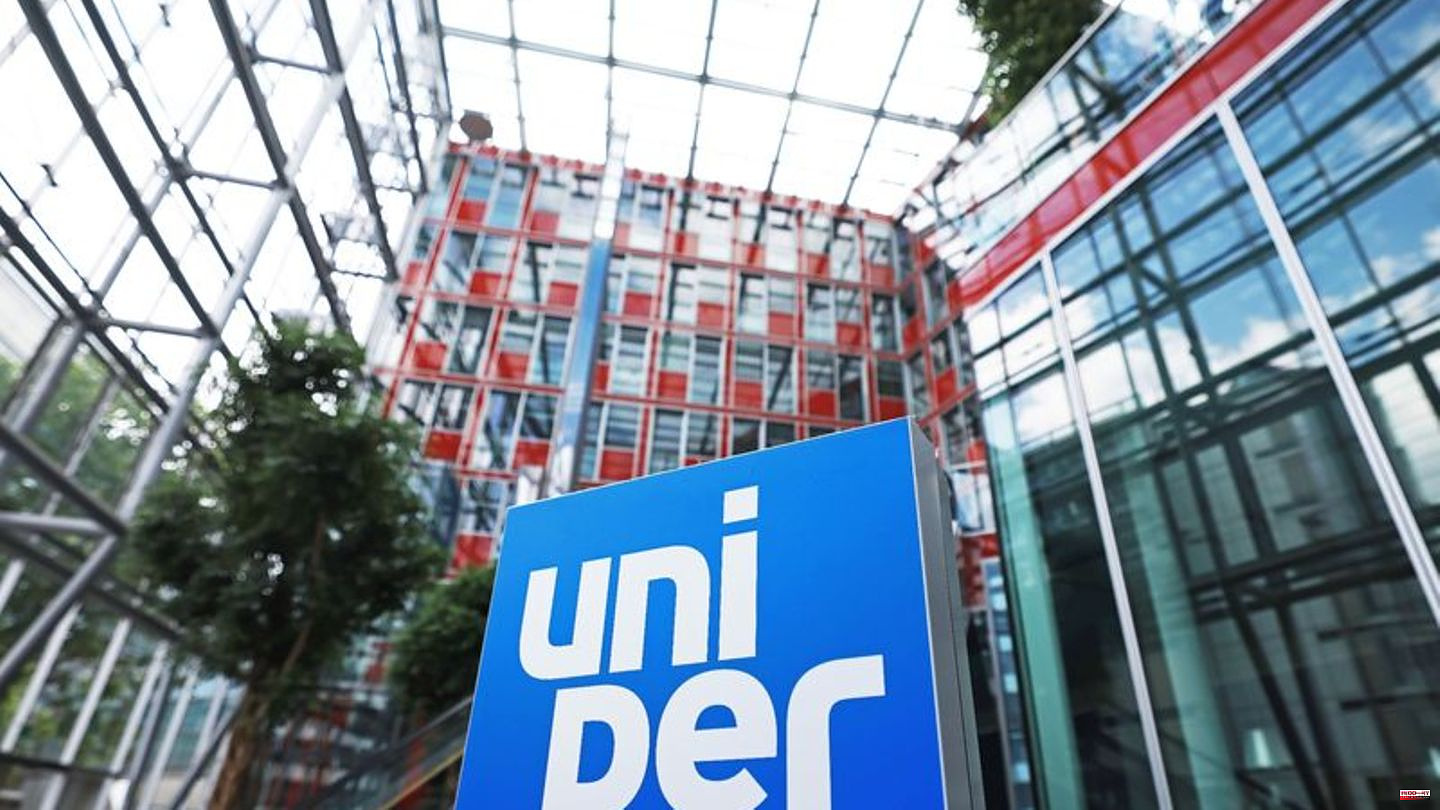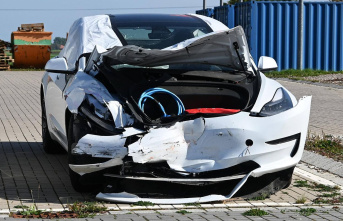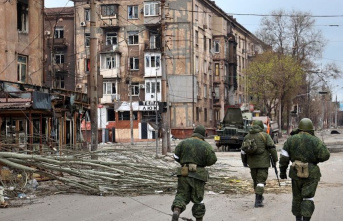To save ailing gas importers, the federal government wants to stick to the instrument of the gas levy for the time being - despite a planned nationalization of the energy company Uniper. The surcharge is necessary as a bridge to ensure Uniper's financial solidity, said Federal Minister of Economics Robert Habeck (Greens). It should therefore be introduced as planned on October 1st.
Uniper is Germany's most important gas importer. According to Habeck, the energy company is responsible for 40 percent of Germany's gas supply.
With the announced nationalization of Uniper, however, there is a situation for the surcharge that needs to be examined, said Habeck. Whether the surcharge can still be levied in accordance with the constitution if Uniper is a state-owned company is a legitimate question, the minister explained. Audits of the financial constitution were in full swing. The implementation of the planned nationalization of Uniper will take at least three months, explained Habeck.
Scholz: "Joint action by the government"
Chancellor Olaf Scholz (SPD) assumes that the traffic light coalition will find a common solution. "It remains a joint approach by the government," said Scholz in an interview with the ARD daily topics.
The gas surcharge was proposed and initiated by the Minister for Economic Affairs and passed into legislation by the government, said Scholz. The corresponding ordinance decisions had been prepared jointly by the government. The Economics Minister and the Finance Minister "both have the same opinion," emphasized the Chancellor.
It is important that the step has now been taken and that it is ensured that Uniper has a perspective, said Scholz with regard to the decision to nationalize the largest German gas importer: "That is what is at stake now." The Ministry of Finance has no constitutional financial concerns
Ministry of Finance has no concerns
The Ministry of Finance, led by the FDP, sees no hurdles in the gas levy. "There are no legal concerns," said a spokesman on Wednesday. Agreement was reached last Friday in the departmental group with the Chancellery, Justice and Finance Ministries that Economics Minister Habeck could introduce the gas levy he had proposed as planned.
The gas surcharge is intended to support important gas importers, effective October 1, who have to buy gas on the commodity exchange at much higher prices after the Russian gas supply freeze. The surcharge for all gas users is currently set at around 2.4 cents per kilowatt hour of natural gas. According to the current status, the first advance payments should go to companies in November at the earliest.
SPD sees "new situation" after Uniper nationalization
From the perspective of the SPD in the Bundestag, it is still unclear whether a gas surcharge will be imposed in Germany. "Now we have a new situation due to the state's entry into Uniper," said Katja Mast, parliamentary director of the SPD parliamentary group. "That's why you have to ask yourself the question again: does it make sense that we make a gas levy and one of the main beneficiaries is then a state-owned company?"
Greens want to “take a very close look at the gas levy from a legal point of view”
For the co-chair of the Greens, Katharina Dröge, the nationalization of Uniper changes the "nature of the surcharge". "And we have to take a very close look at them from a legal point of view. There are concerns about the financial constitution and we have to examine them now," said Dröge in the ARD lunchtime magazine.
CDU: finally cancel gas allocation
The energy expert of the Union parliamentary group Andreas Jung (CDU) renewed his call for the non-introduction of the gas levy. "Robert Habeck must now put all his cards on the table, answer open questions and finally cancel the gas levy," said the CDU politician to the newspapers of the Bayern media group. "Everyone knows she hit a wall." At the latest with the nationalization of Uniper, everyone must be clear: "The traffic light is on the wrong track".
Habeck: "Push free riders off the footboard"
Habeck emphasized that the federal government had found a "legally secure way" to "push so-called free riders off the board". What is meant are the improvements that Habeck had promised to the gas levy after it became known that companies that are not in need could also benefit from the levy.
Uniper, its majority owner Fortum and the federal government agreed on a rescue package worth billions for the ailing energy company on Wednesday. It goes far beyond the stabilization package that was announced at the end of July and envisages an almost complete nationalization of Uniper.
Through a capital increase worth around eight billion euros and the sale of all Fortum shares to the federal government for a further 480 million euros, Germany will receive almost 99 percent of the shares. The takeover of the federal government also includes the replacement of a credit line from Fortum. This consists of a shareholder loan of four billion euros and a so-called guarantee line of four billion euros.
Since the announcement of a stabilization package for Uniper at the end of July, the situation for the group has "dramatically become much more dramatic," said Habeck. With the takeover of Uniper, the federal government made the decision to ensure security of supply in Germany.
Federal Finance Minister Christian Lindner (FDP) spoke of a necessary crisis intervention "to economically secure our gas supply in Germany". This would protect consumers from an uncontrollable situation.
FDP parliamentary group supports nationalization "for the moment"
According to its deputy chairman, Lukas Köhler, the FDP parliamentary group in the Bundestag supports the planned nationalization of Uniper "for the moment". But it must be clear that this should not become a permanent situation, explained Köhler. "As with all other crisis-related investments, the state must withdraw from the company as quickly as possible," he emphasized.
The CSU accuses the federal government of acting too late in nationalization and is pushing for an end to the planned gas levy. The nationalization is "long overdue" and could have saved a lot of uncertainty in the market if this decision had been made in July, said CSU regional group leader Alexander Dobrindt.
Uniper is in trouble because Russia is no longer pumping gas to Germany. The gas wholesaler is a supplier to over 100 municipal utilities and large companies and thus plays a central role in the German gas supply. The company now has to buy the missing gas expensively on the gas market. The pipeline gas from Russia was comparatively cheap. Because of the delivery stop, the prices have now multiplied.
If Uniper were to go bankrupt, there are fears that there would be a domino effect, which would also cause great difficulties for numerous Uniper customers. The public utilities association VKU renewed its call for a protective shield for public utilities. "The municipal utilities are also systemically relevant overall," said VKU boss Ingbert Liebing.
State wants to keep important importers "stable on the market".
Habeck also promised the other large gas importers support if necessary. "As we are showing, the state will do everything necessary to keep the company stable on the market," said Habeck. "That applies to Uniper. That applies to the other large, systemically important companies in Germany."
In addition to Uniper, these include subsidiaries of the former Gazprom Germania company SEFE and the Leipzig energy company VNG, which belongs to the EnBW group.









